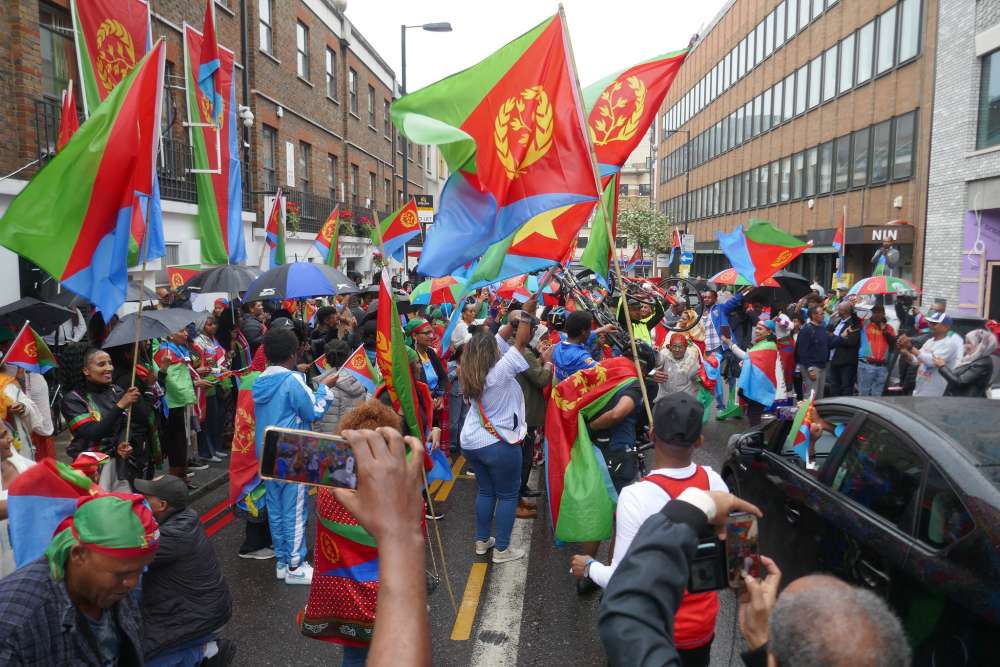Beyond the Headlines

Protests and violent clashes involving Eritrean diaspora communities have sparked considerable public debate in the past weeks and months. From Gießen, Seattle, to Opfikon and Tel Aviv, recent events have drawn much public attention, especially condemnation and shock by observers. How could so few protesters from this tiny African country cause so much damage and potentially destabilize “democratic” systems? While these are warranted reactions, we are also witnessing the proliferation of opinion pieces and tabloid headlines instrumentalizing the events for populist narratives: these single stories are dangerous and require careful contextualization. The string of violence by the diaspora communities should be interpreted not as mob violence by wild Africans, but as a desperate cry for attention to support regime change in Eritrea and curb Eritrea’s autocratic long arm into Western democracies.
In Germany, headlines such as “African conflicts on our soil” or “What is THAT doing on our streets” invoke racist imaginaries of unruly and violent Black migrants and currently monopolize public discourse on the Eritrean diaspora. Recent violence in Stuttgart has further consolidated this perspective. In Israel, such narratives are already being translated into concrete plans for political action in migration policy: Israel’s prime minister Benjamin Netanyahu has not only announced that action will be taken against attackers, but also shared a plan to deport all African asylum seekers from the country. Clearly, there is a fine line between rhetoric-hounding and hostile policy considerations. There is another fine line between efforts to disrupt autocratic repression in democracies by Eritrean protesters, and violence against uniformed representatives of these democracies. Yet, we must also see that political movements include a spectrum of camps ranging from very confrontational elements not shying away from violence to more cooperative elements that are more dialogue-oriented.
It should be emphasized that the escalation of protests only involved certain opposition groups such as “Brigade Nhamedu.” Simultaneously, the Eritrean regime collaborates with its own professionalized group of thugs called “EriBlood.” Non-violent opposition groups have not been outspoken enough to diffuse concerns and contextualize recent violence for the non-Eritrean public. At this moment in time, it is important for Eritrean opposition groups in the diaspora to strategically drive a political campaign away from debates about lump deportations of Africans and toward key issues such as curbing the diaspora tax and illicit money exchange flows as well as targeting large-scale repression and intimidation by the Eritrean regime abroad.
Eritrea’s autocratic ruler Isayas Afewerki has been playing the game for long enough that he is immune to calls for benevolence, dialogue, or personal incentives. The former guerilla fighter has been in power since 1993. While his early rule was marked by euphoria around Eritrea’s newly-won independence, things turned sour between 1998 and 2001 when Isayas fought a bloody border war against Ethiopia and brutally cracked down on 21 influential dissidents who remain missing to this day. Despite the country’s image as isolated and “Africa’s North Korea,” Isayas has continued to meddle in regional wars and amped up his intricate system of repression and intimidation. More recently, Eritrean troops have been heavily involved in the neighboring Tigray war and have been committing numerous war crimes against civilian populations. At the same time, the regime has been able to expand domestic repression through indefinite domestic military service and intimidation of the diaspora through so-called “cultural festivals,” the diaspora tax, or its monopoly on hawala transfers to Eritrea. Beyond large-scale repression, the regime’s activities abroad are also able to generate much-needed foreign currency which has enabled the regime’s survival despite international isolation.
Taken together, these developments are causing the opposition to intensify mobilization and seek out more disruptive techniques. Although in past years there has been gossip about Isayas’ alleged declining health and more recently rumors about defection by an ambassador, the current regime has eliminated serious threats through rewarding status and financial privileges to those who prop up its system. Giving into the regime’s information policy distracts from identifying paths to support the Eritrean opposition. Although violence as an attention-seeking method by select Eritrean opposition groups must be condemned, we, in Western countries and allies for political change in Eritrea, must ask how we can support efforts for change in Eritrea. How do we curb Eritrea’s autocratic influence and long arm in democratic systems?
Additional targeted sanctions including travel bans and asset freezes should aim at Eritrea’s “middle management” of military generals and Isayas’ party officials. These people are often heavily implicated in steering illicit money flows from hawala exchanges or festivals and travel to Europe frequently if they are not already based there. Recently, a Swiss newspaper uncovered how Eritrean regime “spies” infiltrated the Swiss asylum system and used information to target asylum seekers’ families back home. Consequently, migration policy and respective bureaucracies need to be sensitized for autocratic infiltration by Eritrean asylum seekers or meddling by regime-supporting Eritrean translators in the asylum process.
Confrontational and potentially violent dynamics will not end until, as the last consequence, regime change takes place in Eritrea. Given the complicated situation, now is not the time for definitive answers; tensions within Eritrea’s diaspora communities illustrate much broader conflicting objectives and big questions for democratic resilience.
We must ensure that propaganda and repressive strategies by the Eritrean regime do not become blueprints for other autocracies seeking to undermine democratic systems.
This commentary was originally published in Africa Is a Country on September 22, 2023.







